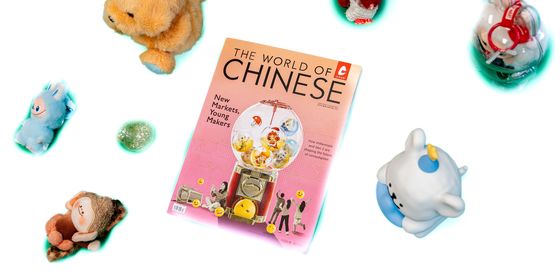May 20, also known as the “Chinese Internet Valentine’s Day,” has over the years morphed into yet another shopping festival, much like the equally made-up “Singles Day.” But this year, the memes and slang that emerged seemed to push back against both consumerism and romance.
Love and romance seem to be going out of style in China—or at least, the marketing strategies built around them are losing their appeal among young people, as evidenced by the declining popularity of the country’s so-called “Internet Valentine’s Day” that falls every year on May 20.
Largely promoted by businesses, especially in e-commerce, this made-up festival began around two decades ago, when the number “520” caught on for sounding like “I love you” in Chinese. It became a romantic occasion for young couples. On this day, people often confess their love with flowers, gifts, or cheesy lines (土味情话 tǔwèi qínghuà). Many also choose this day specifically to tie the knot, often sharing an “official announcement (官宣 guānxuān)” on their social media accounts to create a “sense of ritual (仪式感 yíshìgǎn).”
Even with the new marriage registration regulation that took effect earlier this month—simplifying required documents and lifting location restrictions—couples still formed long lines at the registration office this “520.” But more and more young Chinese, especially those who are single and mockingly call themselves “single dogs (单身狗 dānshēngǒu),” are turning to pragmatism over passion, claiming:
I prefer to make money than to fall in love.
比起谈恋爱,我更喜欢搞钱。
Dear Money, please go out with me.
钱……钱辈,请和我交往。
Instead of seeking love and support from a partner—or worse, becoming a “love brain (恋爱脑 liàn’ài nǎo)” who loses themselves in a relationship—many now prioritize financial independence and personal growth amid the pressures of modern life.
This shift in attitude is partially reflected in the decline of marriages over the past decade: Registered marriages have been dropping for 11 consecutive years since 2013, to less than half the number over a decade ago. The trend showed no signs of turning around this year, with nearly 160,000 fewer couples tying the knot than in the same period last year, according to government data.
Catch up on trending Chinese relationship memes and slang:
- Young Chinese Reclaim Insults About Their Romantic Status Online
- Cheesy Chat-up Lines for Chinese Lovers
- Love on the Brain
For those who choose to stay single, “520” is no longer just about romance—it’s now a day to prioritize smart choices, self-love, or even self-pity in disguise, as one popular saying goes:
The wise steer clear of love, the foolish keep falling for it. Living a diligent life like oxen and horses, we’ll eventually be rich.
智者不入爱河,冤种重蹈覆辙,牛马点缀生活,我们终成富婆。
Along with rising pressures and tightening budgets, couples in love are also reassessing their spending habits and how they express their love. Rather than succumbing to these societal expectations or consumerism trends, which often associate love with expensive flowers, jewelry, or other extravagant celebrations, many are opting to “reject the rose ‘assassins’ and say no to the romance tax (拒绝玫瑰刺客,不为浪漫税买单 jùjué méiguī cìkè, bú wèi làngmànshuì mǎidān).”
For instance, some young lovers have chosen to “pre-celebrate May 20 (预制520 yùzhì wǔ èr líng)” with flowers, presents, and meals on discount, taking good photos to post later on “520.” This savvy solution has drawn netizens’ applause:
This isn’t a pre-made “520”—it’s love’s early-bird special.
这哪里是预制520,这不就是爱情的早鸟价?
While lovebirds may still have plans for the holiday, for singles caught up in the grind, “520” is just another routine—five workdays, two days of overtime on the weekend, and zero time to rest. (5天工作,2天加班,0天休息 Wǔ tiān gōngzuò, liǎng tiān jiābān, líng tiān xiūxi). Many would sarcastically say:
While others are out dating, I’m replying to work messages in the office.
别人在外搂搂抱抱,我在公司好的收到。
How would I describe my love life? Like company benefits—I’ve heard of them, never seen them.
如何形容我的爱情,像公司福利,听过,没见过。
For them, love can take its time, but getting work done on time is a much more pressing matter (爱情可以晚点来,班一定要早点下 Àiqíng kěyǐ wǎndiǎn lái, bān yídìng yào zǎodiǎn xià). As they mockingly state: That sour stench of love? I get the same thing after eating the stinky snail rice-flour noodles (爱情的酸臭味,我吃完螺蛳粉也有 Àiqíng de suānchòuwèi, wǒ chīwán luósīfěn yě yǒu).
Recognizing the shift in sentiment, companies and shopping malls have started adopting “reverse marketing strategies (反向营销 fǎnxiàng yíngxiāo),” using humorous or self-mocking slogans that resonate with younger audiences. In response, consumers—whether they’re seeking love or not—have also found new ways to dodge these new sales tactics veiled in the smart-sounding slogans.
For instance, a mall in Changsha, capital city of central China’s Hunan province, displayed on a giant LED screen: “How do I spend my May 20? I skip it given my SVIP status. (520怎么过?我SVIP直接跳过。Wǔ èr líng zěnme guò? Wǒ SVIP zhíjiē tiàoguò.)”—referencing the paid memberships on streaming platforms that let users skip ads.
Many have even found ways to take advantage of deals meant for couples:
Second one half-off? Come on, it’s not like I can’t finish both by myself.
第二份半价,一个人又不是吃不下。
Moreover, instead of falling for cheesy pick-up lines and romantic gestures, young people are using reason to resist the day’s toxic allure:
He said he’d take care of you—careful, he might mean with leftovers.
他说,要养你,小心,是剩饭。
This skepticism even expands to the recent policy changes, where a marriage no longer requires a household registration book, or hukouben (户口本), leading many to question:
Remember—“easy in, hard out”? That’s just another word for a scam.
记住,宽进严出是什么?诈骗。
And finally, some joked that it’s their loftier aspirations—like contributing to socialist development rather than chasing personal gain—that keep them away from romance and its potential pitfalls, a rationale few can quite reject:
I’m a future builder of socialism. With this responsibility, how could I waste time on romance?
我乃社会主义接班人,岂能谈儿女情长?













